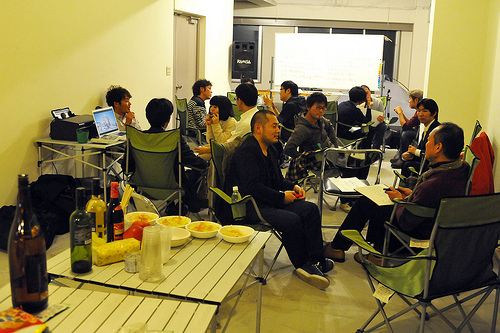Politics
Elections are more fun when you take part and vote! Aspirations of the Senkyo Camp
2012.12.13 Mitsuko Iwai

Creative Commons, Some Rights Reserved, Photo by Koichiro Suzuki/Senkyocamp
Senkyo Camp Shibuya resembles a camping ground.
The Lower House general elections are just around the corner. But did you know that the average age of eligible voters in Japan is 53? Japan's society is aging at a very rapid speed, at one of the highest speeds among key countries, and by 2050, this figure is said to surpass 60. But does this mean that policies developed will cater more towards the elderly?
Only around 10% of eligible voters in Japan are under 35. Amid such conditions, a young voter from Fukushima has expressed his concern, "Ultimately, since more elderly vote, will new policies be created by political parties favored by the elderly? If that's the case, even if we wanted change, we won't be to instigate it. This reality is discouraging."
A new movement began on December 1st in Shibuya. Senkyo (Election) Camp was launched with the desire to change the current environment, which seems to give only those with social standing, power, and financial means the right to speak, to empower each and every one of us with such right so that we may all play a part in creating a bright future. The idea was proposed by Mr. Nao Suzuki, the publisher of greenz, Mr. Koichi Suzuki from Earth Garden, and Mr. Hiroshi Tasaka, the representative of the Japan Social Entrepreneur Forum and former special advisor to the cabinet, who wanted to change Japan's "spectator democracy" to a "participatory democracy." They chose to use the word, "camp" for the movement because at a campsite, each person fulfills a role, whether it be starting a fire or fetching water.
They encouraged people across the nation to setup a Senkyo Camp, and now there are 13 camps nationwide in locations such as Yokohama, Ishinomaki, Osaka, Kumohara (Kyoto), Kumamoto, and Fukushima. In Shibuya, where this all began, talk shows and meetings to help improve the turnout of voters are being held daily. On the 12th, a gathering, which encouraged participants to share ideas that would make people want to go and vote was held. This meeting was copywriter, Mr. Susumu Namikawa's idea. "The reality is, no one does anything interesting for the elections. In other words, it's virgin soil for interesting, creative work." With this proposition, Mr. Namikawa called on students majoring in art, designers, CM planners, and copywriters to take part.
When you think of elections, you may feel like you have to put on a serious face and say something critical or feel that you cannot discuss politics with your friends for fear that it might be a turn off. So we may have voluntarily refrained from taking part. At the "Senkyo Camp in Fukushima," people spoke up and said: "I don't like organized votes because it reflects what the company wants, not us as individuals." "I like the individual candidates, but when they group together as a political party, not so much." Such exchange may help change the way elections are organized in the future.
Mr. Tasaka explained, "Participatory democracy means more than simply taking part in elections. You must always be involved in bringing forth change to society." The Senkyo Camp movement will continue even after the Lower House general elections are over.
Related URL/media
![]()









